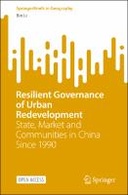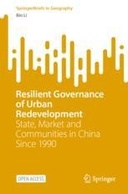Explore

Resilient Governance of Urban Redevelopment
Bin Li
2023
0 Ungluers have
Faved this Work
Login to Fave
To examine the origins, characteristics, and outcomes of resilient governance with Chinese characteristics, this open access book takes Guangzhou, a typical Chinese city from 1990 to 2015, as an example. Through participant observation, semi-structured interviews, and the collection of secondary data, this book finds that (1) the institutional context can be described as an authoritarian land-oriented pro-growth regime; (2) there are three phases with different patterns of governance: the Primitive Market Phase (1990–1998), the Pure Government Phase (1998–2006) and the Multiple Players Phase (2006–2015); (3) redevelopment can serve as a model of resilient governance because it changes in time in a dynamic environment to maximise economic growth; (4) an authoritarian land-oriented pro-growth regime is the key to support such a resilient governance model. This is an open access book.
This book is included in DOAB.
Why read this book? Have your say.
You must be logged in to comment.
Rights Information
Are you the author or publisher of this work? If so, you can claim it as yours by registering as an Unglue.it rights holder.Downloads
This work has been downloaded 106 times via unglue.it ebook links.
- 40 - epub (None) at Unglue.it.
- 37 - pdf (None) at Unglue.it.
Keywords
- Authoritarian Resilience
- Chinese cities
- Development Studies
- Geography
- Human geography
- Interdisciplinary Studies
- Politics & government
- Public administration
- Reference, information & interdisciplinary subjects
- Resilient Governance
- Society & Social Sciences
- sustainability
- The environment
- Urban Governance
- urban planning
- Urban policy
- Urban Reconstruction
- Urban Redevelopment
- Urban regeneration
- Urban renewal
Links
DOI: 10.1007/978-981-99-2928-3web: https://link.springer.com/book/10.1007/978-981-99-2928-3
Editions



